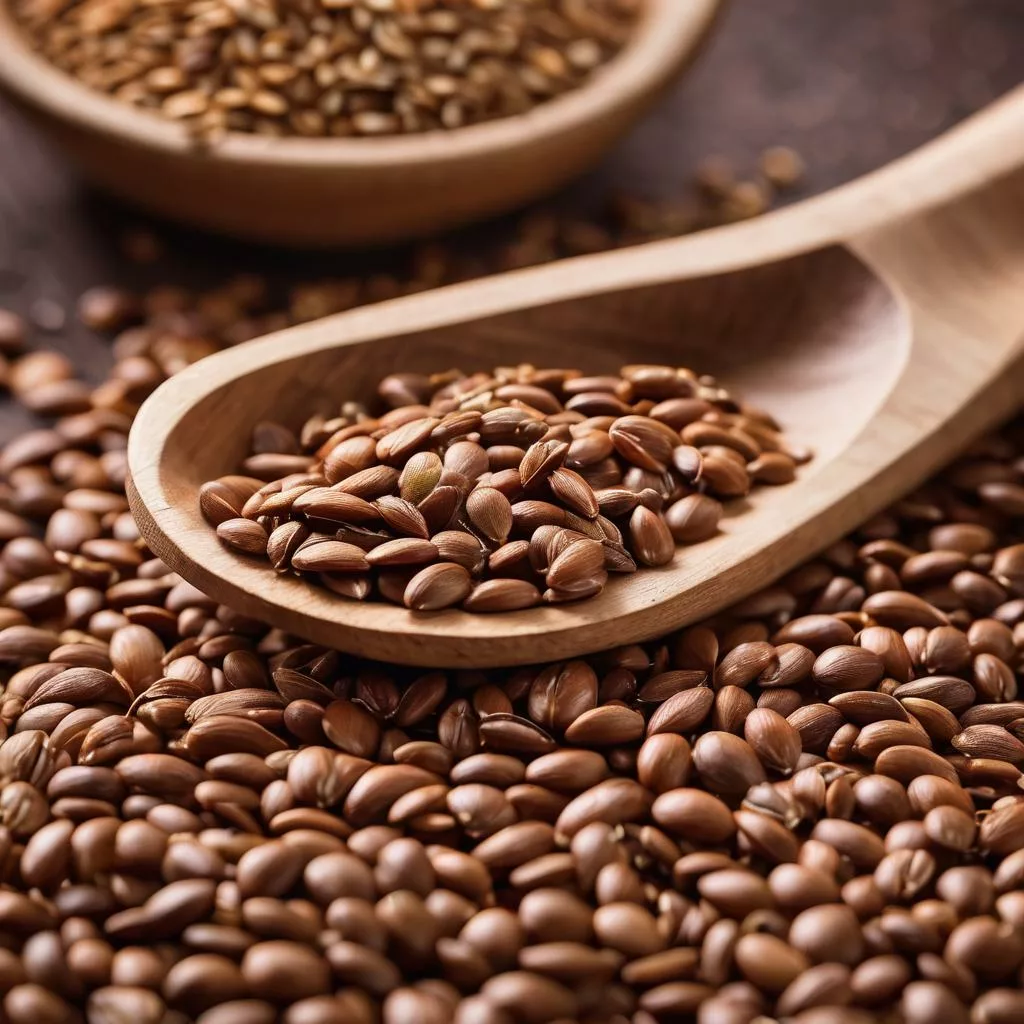
Flaxseed, a small but mighty seed, is a versatile ingredient that has gained recognition for its numerous health benefits. As someone who strives to maintain a healthy lifestyle, incorporating flaxseed into your diet can be a game-changer. Packed with protein, fiber, and omega-3 fatty acids, this superfood not only boosts the nutritional value of your meals but also offers a range of health advantages.
One of the key reasons why flaxseed is gaining popularity is its potential to lower the risk of cancer. Studies have shown that the lignans present in flaxseed possess powerful cancer-fighting properties. In addition to this, flaxseed aids in weight maintenance by promoting feelings of fullness and reducing cravings. It’s no wonder that it has become a go-to choice for those looking to shed some pounds or maintain their current weight. Moreover, flaxseed is known for improving heart health due to its high content of omega-3 fatty acids, which help reduce inflammation and support cardiovascular function.
Incorporating flaxseed into your everyday meals and snacks is easier than you think! Whether you sprinkle it on top of your yogurt or blend it into your smoothies, there are endless ways to enjoy the benefits of this superfood. In this comprehensive guide to flaxseed, we will explore how you can effortlessly incorporate it into your diet while providing practical tips and evidence-based information along the way. Get ready to unlock the power of flaxseed and embark on a journey towards a healthier lifestyle.
Introduction
Flaxseed, with its versatile nature and numerous health benefits, is a powerful ingredient that can elevate the taste and texture of any recipe while providing essential nutrients like protein, fiber, and omega-3 fatty acids. Flaxseed nutrition is impressive, as it contains a good amount of protein, which is essential for building and repairing tissues in the body. Additionally, flaxseed is rich in dietary fiber, which aids digestion and helps maintain a healthy weight by promoting feelings of fullness.
Incorporating flaxseed into your diet doesn’t have to be complicated. There are countless flaxseed recipes available that allow you to enjoy the benefits of this superfood in delicious ways. From adding ground flaxseeds to smoothies or oatmeal to using them as an egg substitute in baking, there are plenty of creative ways to incorporate flaxseeds into your meals and snacks.
If you find it challenging to include enough flaxseeds in your diet through food alone, supplementation can be an option. Flaxseed supplements come in various forms, such as capsules or oils. However, it’s important to consult with a healthcare professional before starting any new supplement regimen.
Research on the health benefits of flaxseeds continues to grow. A study published in 2014 on the Journal of Food Sciences concluded that regular consumption of flaxseeds may help reduce cholesterol levels and blood pressure and lower the risk of certain cancers due to their high lignan content. The evidence also suggests that the omega-3 fatty acids found in flaxseeds may contribute to heart health by reducing inflammation and improving overall cardiovascular function.
Overall, incorporating flaxseeds into your diet can provide numerous health benefits. Whether you choose to use them in recipes or opt for supplementation under medical guidance, these tiny seeds offer a wealth of nutritional value that can support your well-being. So go ahead and explore different ways to enjoy the goodness of flaxseeds while reaping their health-promoting benefits.
The Power of Flaxseed

Packed with protein, fiber, and omega-3 fatty acids, this versatile ingredient has the power to enhance your health in numerous ways. Flaxseed is a nutritional powerhouse that offers a wide range of benefits. Its high protein content makes it an excellent addition for those looking to increase their protein intake, especially vegetarians or vegans. Additionally, the fiber found in flaxseed can help promote healthy digestion and prevent constipation. The omega-3 fatty acids present in flaxseed have been shown to support heart health by reducing inflammation and improving cholesterol levels.
The nutritional content can vary slightly based on the form of flaxseed (whole, ground, etc.) and the specific brand. The table below provides a guide to the nutritional contents of flaxseed
| Nutrient | Amount |
| Calories | 551 |
| Total Fat | 4.3g1 |
| Saturated fat | 0.1g1 |
| Polyunsaturated fat | 2g2 |
| Monounsaturated fat | 0.5g3 |
| Total Carbohydrate | 3g1 |
| Dietary fiber | 2.8g1 |
| Protein | 1.9g1 |
| Magnesium | 9.8mg1 |
| Iron | 0.1mg1 |
| Calcium | 6.4mg1 |
| Potassium | 20mg1 |
| Sodium | 1mg1 |
Not only is flaxseed nutritious, but it also adds a pleasant nutty flavor and crunchy texture to various recipes. You can easily incorporate flaxseed into your diet by sprinkling ground flaxseeds on yogurt or oatmeal, adding them to smoothies or baked goods, or even using them as an egg substitute in vegan recipes. This versatile ingredient can be used in both sweet and savory dishes, making it easy to reap its benefits without compromising taste.
Research has shown that consuming flaxseed regularly may have significant health benefits. Studies have suggested that the lignans found in flaxseed may help reduce the risk of certain types of cancer, such as breast and prostate cancer. Furthermore, the alpha-linolenic acid (ALA) present in flaxseed has been linked to improved heart health by reducing blood pressure and lowering cholesterol levels.
Incorporating flaxseed into your diet can provide numerous health benefits due to its impressive nutritional profile. Whether you choose to enjoy it as a topping or use it as an ingredient in your favorite recipes, this powerful seed can offer essential nutrients while enhancing the taste and texture of your meals. With ongoing research supporting its potential advantages for gut health, cardiovascular well-being, and cancer prevention, among others, flaxseed is a simple yet effective way to boost your overall health and well-being.
Health Benefits of Flaxseed
If you’re looking to improve your overall health, incorporating flaxseed into your diet can be a game-changer. Flaxseed offers a wide range of health benefits, particularly when it comes to digestion. These tiny seeds are packed with fiber, which is crucial in maintaining regular bowel movements and promoting healthy digestion. By adding flaxseed to your meals or snacks, you can help prevent constipation and promote a healthy gut. Turmeric is another superfood with many health benefits.
In addition to its positive effects on digestion, flaxseed is also known for its potential cardiovascular benefits. The omega-3 fatty acids found in flaxseeds have been shown to reduce inflammation and improve heart health. These fatty acids may lower the risk of heart disease by reducing blood pressure and cholesterol levels, as well as preventing the formation of blood clots. Adding flaxseed to your diet can be an easy way to support cardiovascular health and reduce the risk of heart disease.
Another impressive benefit of consuming flaxseed is its potential role in cancer prevention. Flaxseeds are rich in lignans, which are plant compounds that have powerful antioxidant properties. These lignans have been studied for their ability to inhibit the growth of cancer cells and reduce the risk of certain types of cancer, such as breast and prostate cancer. Including flaxseed in your daily routine may offer some protection against these diseases and contribute to overall cancer prevention.
Flaxseed has also been linked to weight management due to its high fiber content and ability to promote feelings of fullness. Including flaxseed in your meals or snacks can help curb cravings and prevent overeating, making it easier to maintain a healthy weight or even lose weight if desired.
Lastly, one of the most well-known benefits of flaxseed is its ability to reduce cholesterol levels. The soluble fiber found in flaxseeds helps bind bile acids in the intestines, leading to increased excretion of cholesterol from the body. This can result in lower levels of LDL (bad) cholesterol, which is a major risk factor for heart disease.
Incorporating flaxseed into your diet can have numerous positive effects on your health. From improving digestion to promoting heart health, cancer prevention, weight management, and reducing cholesterol levels, these tiny seeds pack a powerful punch when it comes to supporting overall well-being.
Incorporating Flaxseed into Your Diet

To incorporate flaxseed into your diet and reap its numerous health benefits, consider adding these versatile seeds to various recipes and meals. Flaxseed can be easily incorporated into your daily routine by using it in a variety of recipes. One popular option is to add flaxseed to smoothies for an extra boost of nutrition. Simply sprinkle a tablespoon or two of ground flaxseed into your favorite smoothie recipe and blend until smooth. Not only will this enhance the flavor and texture of your smoothie, but it will also provide a good amount of protein, fiber, and omega-3 fatty acids.
Another great way to incorporate flaxseed into your diet is by using it in baking. You can substitute some or all of the flour in a recipe with a ground flaxseed meal for added nutrition and a nutty flavor. Flaxseeds are also commonly used as an egg substitute in vegan baking recipes. To replace one egg, simply mix one tablespoon of ground flaxseed with three tablespoons of water and let it sit for a few minutes until it thickens. This mixture can then be used as a binding agent in place of eggs.
Lastly, you can get creative with incorporating flaxseed into your meals by trying out new recipes that specifically call for this nutritious ingredient. From homemade granola bars to energy balls and even savory dishes like roasted vegetables or meatloaf, there are countless ways to use flaxseeds in cooking. By experimenting with different recipes and meal ideas, you can easily incorporate this superfood into your diet while enjoying its many health benefits.
Incorporating flaxseed into your diet doesn’t have to be complicated or time-consuming. With just a little bit of creativity and experimentation, you can easily add these nutritious seeds to your favorite recipes and meals. Whether it’s through smoothies, baking, or trying out new dishes that feature flaxseeds as a main ingredient, there are plenty of delicious and healthy ways to enjoy the benefits of flaxseed in your diet. So go ahead and start exploring the world of flaxseed recipes today!
Flaxseed: A Rising Trend in Health and Wellness
Flaxseed is becoming increasingly popular in the health and wellness industry, with sales of flaxseed products expected to reach $2.5 billion by 2027. This rise in popularity can be attributed to the numerous health benefits associated with consuming flaxseeds. People are recognizing their nutritional value, which is packed with protein, fiber, and omega-3 fatty acids. As a result, more individuals are incorporating flaxseed into their diets to improve their overall well-being.
One of the great things about flaxseed is its versatility in recipes. It can be easily incorporated into various dishes, making it an excellent addition for those looking to boost their nutrition. Flaxseed is commonly used in baking as a substitute for eggs or oil due to its binding properties. You can add ground flaxseed to your favorite muffin or cookie recipe for an extra dose of fiber and omega-3s. Additionally, flaxseed can be blended into smoothies for added creaminess and nutritional value. Simply sprinkle some ground flaxseeds on top of your salad to give it a nutty flavor and reap the benefits of its nutrients.
If you’re looking for inspiration on how to include more flaxseed in your diet, there are countless recipes available online that incorporate this superfood ingredient. From energy bars and granola to pancakes and bread, there’s no shortage of delicious ways to enjoy all that flaxseed has to offer. Experimenting with different recipes will not only enhance the taste and texture of your meals but also provide you with valuable nutrients that promote good health.
As people become more conscious of their well-being, they are embracing the rising trend of using flaxseed in their daily lives. Scientific evidence highlighting its various health advantages, such as lowering cholesterol levels and assisting with digestion, supports its popularity. By incorporating flaxseeds into baking, smoothies, and salads, individuals can easily enjoy the nutritional advantages these tiny seeds provide. So why not try out some flaxseed recipes today and experience the positive impact they can have on your overall health?
Frequently Asked Questions
Are there any potential side effects or risks associated with consuming flaxseed?
There are potential side effects and risks associated with consuming flaxseed. It may cause allergic reactions in some individuals. Flaxseed can also have hormonal effects, digestive issues, interact with medications, and impact blood sugar levels.
Can flaxseed help with weight loss or management?
Yes, flaxseed can help with weight loss or management. It has been shown to promote appetite control, boost metabolic rate, and improve body composition. Incorporating flaxseed oil or smoothie recipes into your diet can be beneficial.
How much flaxseed should be consumed daily to reap its health benefits?
To reap the health benefits of flaxseed, it is recommended to consume about 1-2 tablespoons daily. Incorporating flaxseed into your daily diet can be done by adding it to smoothies, yogurt, oatmeal, or using it as an egg substitute in baking. Including flaxseed in your diet may improve overall wellness.
Is it necessary to grind flaxseed before consuming it?
Grinding flaxseed before consumption is essential to unlocking its nutritional benefits. Whole flaxseeds can pass through the digestive system undigested, limiting their benefits. To incorporate flaxseed into your diet, grind it using a coffee grinder and store it in an airtight container for maximum freshness.
Can flaxseed be used as a substitute for eggs in baking recipes?
Yes, flaxseed can be used as a substitute for eggs in baking recipes. To replace one egg, mix 1 tablespoon of ground flaxseed with 3 tablespoons of water and let it sit for a few minutes to form a gel. This flaxseed gel can then be used in place of eggs in your favorite recipes. Try using flaxseed as an egg replacer in vegan baking or if you have an egg allergy or follow a plant-based diet. It’s a nutritious alternative that adds fiber and omega-3 fatty acids to your baked goods.
Conclusion
In conclusion, flaxseed is truly a nutritional powerhouse that deserves a place in your kitchen. Its impressive combination of protein, fiber, and omega-3 fatty acids makes it a valuable addition to any diet. Just like a superhero saving the day, flaxseed has the power to lower the risk of cancer, aid in weight maintenance, and improve heart health.
But wait, there’s more! With its abundance of lignans, flaxseed puts on its armor and fights against cancer cells with all its might. It’s like having your own personal warrior in the battle against this deadly disease. And when it comes to incorporating flaxseed into your meals and snacks, the possibilities are endless. You can sprinkle it on top of yogurt for added crunch and nutrition, or mix it into smoothies for an extra boost of goodness.
So why not join the rising trend in health and wellness by embracing the wonders of flaxseed? It’s time to take control of your health and make every meal count. With just a small amount each day, you can fuel your body with essential nutrients that will keep you feeling strong and vibrant. So go ahead, grab that bag of flaxseed from your pantry shelf, and embark on a journey towards better health today!


